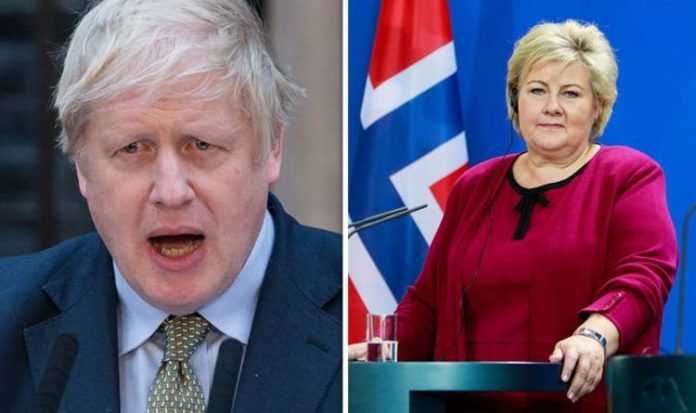Back in Downing Street, Mr Johnson was upbeat as he declared Britain had secured its negotiating objectives.
The agreement will come into force on January 1, guaranteeing tariff-free trade on most goods and creating a platform for future cooperation on issues such as crime-fighting, energy and data sharing.
Despite Downing Street calling a “mutual compromise”, it does seem Mr Johnson capitulated on one of the most contentious areas of the talks: fishing rights.
The UK wanted any fishing agreement to be separate from the trade deal with access negotiated annually in a similar fashion to Norway’s agreement with the bloc.
Norway is an independent coastal state, with the rights and responsibilities under international law associated with that status. Stocks shared with the EU are managed through annual bilateral negotiations. Each autumn these talks set total allowable catches on the basis of scientific advice.
This contrasts starkly with the position of the UK fishing industry within the EU’s Common Fisheries Policy – something the EU wanted to maintain at all costs.
In the end, the UK agreed to a further five-and-a-half years of “predictability” for fishing communities, with the UK leaving the CFP.
Stock quotas for UK fishers will increase over a five-year timeframe, incrementally between now and 2026.
This means Britain will fish just over 66 percent of UK waters – in stark contrast with Norway, which catches 90 percent of its own fish.
During the transition, EU fishing vessels will still have full access to fish in UK waters and after that, negotiations will be annual just like the ones between Norway and the bloc.
However, the EU will be able to retaliate with tariffs if Britain refuses to grant it access, meaning London will never be fully in control of its waters.
Lib Dem MP for Orkney and Shetland Alistair Carmichael said: “It is no state secret that fishing has been at the heart of negotiations being prolonged and it’s welcome for everyone that there’s a deal at all.
JUST IN: EU chaos: Macron could go against bloc’s rules to appease rival
“But on first flush this sounds rather different than what the fishing community was promised.
“A deal with a five-year transitional period is maybe not the biggest difficulty but at the end of it the expectation seems to remain that only 25 percent of quota held by EU nations for British waters will be returned to the UK fleet.”
Barrie Deas, chief executive of the National Federation of Fishermen’s Organisations, said there will be “frustration and anger” across the industry about the outcome of the negotiations.
Mr Deas said he thought the failure to secure a 12-mile exclusion zone is “going to be particularly contentious”.
He said: “In the end it was clear that Boris Johnson wanted an overall trade deal and was willing to sacrifice fishing.
DON’T MISS:
Boris Johnson’s ‘only chance’ to enter trade partnership with US [EXCLUSIVE]
Dan Hannan warns THREE countries will follow UK out of bloc [INSIGHT]
EU reserves right to ‘suspend deal’ if UK drifts away from ECHR [ANALYSIS]
“The broad feeling is that the UK has made significant concessions on fish in order to secure a trade deal. I think the industry will be extremely disappointed.
“We have secured increases in quota from the EU but they don’t come anywhere close to what our entitlement is in international law. So I think there will be frustration and anger across the industry about that.”
Elspeth Macdonald, chief executive of the Scottish Fishermen’s Federation, agreed that the deal did not appear to deliver on the industry’s aspirations.
She said: “The principles that the Government said it supported – control over access, quota shares based on zonal attachment, annual negotiations – do not appear to be central to the agreement.
“After all the promises given to the industry, that is hugely disappointing. We expect to be able to study the details in the coming days and will issue a further statement when we have been able to do so.”







